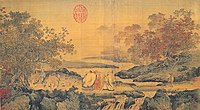
Photo from wikipedia
Abstract Objective The present study examined the relationship between cultural orientation styles and sleep quality among Chinese and Korean undergraduates in the United States. Method: A total of 266 participants… Click to show full abstract
Abstract Objective The present study examined the relationship between cultural orientation styles and sleep quality among Chinese and Korean undergraduates in the United States. Method: A total of 266 participants (M age = 20.55 years, SD = 1.93; 49% Chinese, 51% Korean) completed an online survey. Ethnic identity and American identity measures were used to categorize participants into one of four cultural orientations: bicultural, Asian, American, and marginal. Sleep quality was assessed using the well-validated Pittsburgh Sleep Quality Index. Results: Seventy percent of participants were poor-quality-sleepers. Regression models showed that marginal orientation was associated with worse sleep quality as compared to bicultural orientation and Asian orientation. Conclusions: Poor sleep is prevalent among Asian undergraduates in the U.S. and may be further heightened for those who are disconnected from both their ethnic and American cultures. Promoting a sense of cultural connectedness may help to increase their sleep quality.
Journal Title: Journal of American College Health
Year Published: 2020
Link to full text (if available)
Share on Social Media: Sign Up to like & get
recommendations!